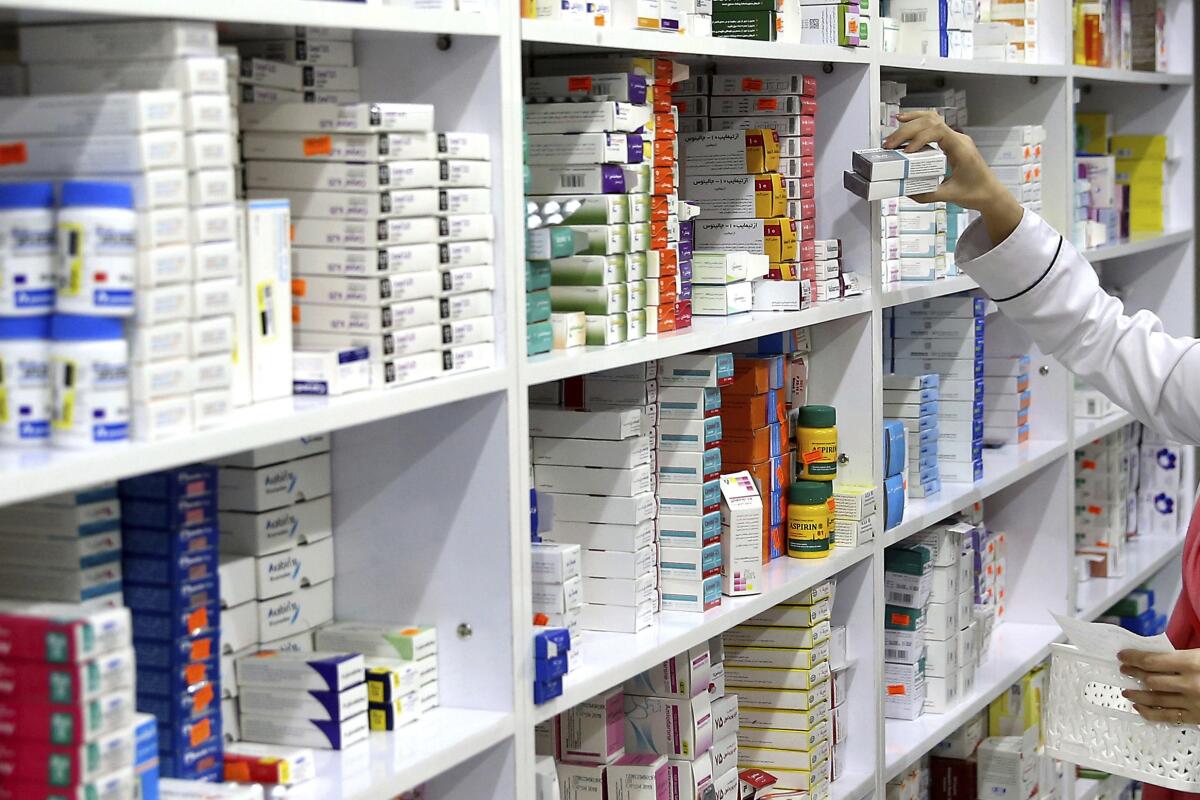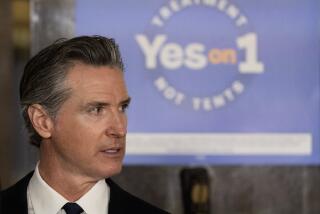California eyes selling its own brand of generic prescription drugs to battle high costs

California would become the first state to sell its own brand of generic prescription drugs in an effort to drive down rising healthcare costs under a proposal Gov. Gavin Newsom is expected to unveil in his new state budget Friday.
A broad overview of the ambitious but still conceptual plan provided by Newsom’s office says the state could contract with one or more generic drugmakers to manufacture certain prescriptions under the state’s own label. Those drugs would be available to all Californians for purchase, presumably at a lower cost. The governor’s office said the proposal would increase competition in the generic drug market, which in turn would lower prices for everyone.
The proposal drew both praise and skepticism Thursday as healthcare experts said they were eager to see details on how the state would rein in drug prices that have become increasingly out of reach for many in the state.
“It’s an interesting idea without there being any specifics,” said Craig Garthwaite, director of the healthcare program at Northwestern University‘s Kellogg School of Management. “The question is: What is the goal? Is it to decrease aggregate spending on drugs or fix market failures?”
Whether prescription drugmakers would follow California’s lead as Newsom’s administration has suggested is far from certain. And other key details, including what prescriptions would be manufactured and the timeline for the venture, were not provided.
“A trip to the doctor’s office, pharmacy or hospital shouldn’t cost a month’s pay,” Newsom said in a statement. “The cost of healthcare is just too damn high, and California is fighting back.”
Combating high prescription drug prices has been a priority for Newsom since he took office a year ago, tapping into an area of great concern to the public. Six out of 10 Americans report taking at least one prescription drug, while nearly 80% say the price of those medicines is unreasonable, according to a Kaiser Family Foundation report last year. The issue has also become a priority for candidates courting supporters, with 70% of registered voters saying they favor candidates who support lowering drug costs, a 2018 Kaiser Family Foundation poll found.
“Every state has been frustrated with high drug prices,” said Trish Riley, executive director of the National Academy for State Health Policy. “They want to balance their budgets and these drug price spikes make it difficult. This could have tremendous impact.”
No other state has attempted to cut out the supply chain that leads to drug markups, Riley said, but there is another, smaller-scale model California can turn to.
More than 1,000 hospitals in 46 states are a part of a nonprofit company called Civica Rx, which formed in 2018 to manufacture generic injectable drugs used in hospitals to lower costs and create a stable supply of the medicines. The nonprofit delivered its first generic drug to hospitals in the fall, an antibiotic that had been in short supply.
“It’s an example of what aggressive purchasing can accomplish,” Riley said.
Democratic presidential candidate Sen. Elizabeth Warren of Massachusetts proposed a bill in 2018 to establish an Office of Drug Manufacturing, which would have allowed the federal government to make prescription drugs or contract with drug companies to produce them in order to lower costs for patients and reduce shortages. The bill did not advance, although Warren continues to promote the concept in her campaign.
Pharmaceutical Research and Manufacturers of America, the industry’s lobbying arm, said it is “waiting to receive additional details from the governor on his proposals.”
But others have expressed skepticism at the state’s potential move into the drug market.
“Frankly, I think it’s a ludicrous proposal that demonstrates a profound misunderstanding of generic drug economics,” said Adam Fein, chief executive of the Drug Channels Institute, a market research and consulting firm. “It’s like saying you want to go to Post [Consumer Brands] for your Fruity Pebbles and open a supermarket to buy them. It doesn’t make sense.”
Health experts said California’s plan has the potential to assist consumers if done correctly but cautioned that the state should not expect it to yield significant savings. Those experts said the state could identify drugs that have not generated sufficient competition among generic drug manufacturers and try to compete, but that would mean producing medicines that are in less demand.
It is unlikely that would lead to large savings for the state, but it could drive down prices on some less commonly used drugs for a smaller number of Californians, said USC health economist Geoffrey Joyce.
“This is not a bad move,” Joyce said. “But I wouldn’t oversell it. It will make a modest dent in overall drug spending and drug pricing in California. You are benefiting a modest group of patients, but you are benefiting them in a significant way.”
Garthwaite said the plan has potential to drive down prices, but it also has risks.
“Just because California makes these drugs, doesn’t mean they will make them at a lower cost,” he said. “They would have to target places where the margin is high. I would be worried about them having the discipline to know which markets to enter.”
In October, the state released its first report detailing wholesale drug price increases using data from a pricing transparency law passed in 2017. That report showed 114 generic drugs with reportable price hikes had the largest median price increase from 2017 through the beginning of 2019, rising 37.6%, according to the Office of Statewide Health Planning and Development. That increase was based on the list prices of the drugs before discounts and rebates. Overall, the median list price for all drugs rose 25.8% over the three-year period, according to the report.
But the data include only cases in which generic drugs were subject to price increases and do not account for retail prices that consumers pay, which have been declining, said Allen Goldberg, a spokesman for the Assn. for Accessible Medicines, a trade group for generic drug manufacturers.
“If we’re going to craft policy, let’s understand the data,” Goldberg said.
Last year, Newsom signed executive orders to consolidate the state’s prescription drug purchases into a government-run program, a plan that is still in its early phases. Under the current system, Medi-Cal and state agencies separately negotiate prescription drug prices, but Newsom wants to combine the efforts to give the state more purchasing power.
The executive orders last year called for the state-run collective to be open to small businesses, California residents and local governments, with a handful of counties already pledging to join, including Los Angeles.
On Friday, Newsom is expected to announce plans to expand on the state’s bulk buying plan and seek additional partnerships. He plans to propose a drug pricing schedule for California, a system in which drug manufacturers would bid to sell their prescription drugs at set uniform prices in the state. Newsom’s plan calls for drug prices to be equal to or lower than those of any other state, national or global purchaser in order to sell the products in California.
No other specifics for the plan were made available. Newsom has said he would like to open the state’s future bulk buying program to all entities in California that negotiate with drug manufacturers, including Medi-Cal and the private insurance market.
“These nation-leading reforms seek to put consumers back in the driver seat and lower healthcare costs for every Californian,” Newsom said in a statement.
More to Read
Start your day right
Sign up for Essential California for news, features and recommendations from the L.A. Times and beyond in your inbox six days a week.
You may occasionally receive promotional content from the Los Angeles Times.







